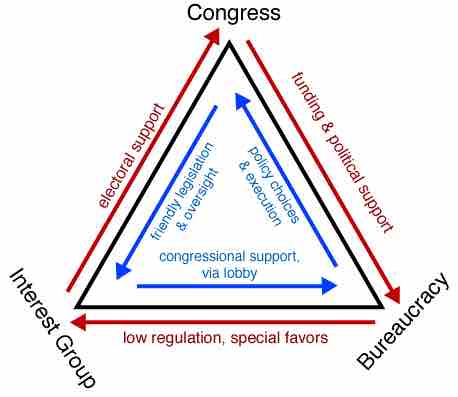Introduction
Interest groups are comprised of individuals with shared knowledge, status, or goals, and in many cases these groups advocate for particular political or social issues. In the United States, interest groups are often associated with lobbying groups, who seek to influence government officials to act favorably towards them. Interest groups, however, are not always involved in lobbying. They may not be politically active, or else they may use indirect tactics such as media campaigns, research, and public opinion polls in order to advance their cause.

The Iron Triangle
In United States politics, the iron triangle comprises the policy-making relationship among the congressional committees, the bureaucracy, and interest groups.
Interest groups that are politically active with regards to one or more issues are called advocacy groups. In liberal democracies, advocacy groups tend to treat bureaucracy as their main channel of influence, because that is where the decision-making power lies. The aim of advocacy groups is to influence a member of the legislature to support their cause by voting a certain way. The practice of attempting to influence lawmakers is called lobbying, and the effectiveness of a group's lobbying efforts is usually tied to its access to resources (almost always financial).
Interest Groups and Resources
Interest groups may gain influence because of their access to money. Indeed, financial resources are often critical in influencing governmental policy. In some cases, money is used directly to influence politicians — for example, a lobbyist may treat a legislator to an expensive dinner. These instances are almost always considered corrupt, and are often outlawed as bribery. Money can also be used in more subtle ways to pressure lawmakers into voting in a particular way. For example, because they play a large role in the national economy, large corporations have an advantage in influencing lawmakers. If these large corporations were to suddenly become less successful, it might create economic trouble, which could turn public opinion against elected officials. Thus, the wealthier a corporation is, the more political clout it tends to have. Likewise, large corporations have greater access to politicians than other groups, because corporate leaders often have insider status in powerful groups. Moreover, an interest group might also make use of financial resources in order to donate to a political campaign. In this instance, the donation is not explicitly tied to a policy vote, and is therefore a legal contribution. That being said, the expectation is that interest groups will use their wealth to elect candidates that support their issues. In all of these ways, interest groups use money to gain success and influence on many levels.
Issue Campaigns
Apart from using money to directly influence bureaucrats, interest groups may also use their wealth to launch issue campaigns. In this case, organizations try to gain popular support among American voters for a particular issue. Ultimately, the goal of this tactic is to pressure legislators into acting a certain way in response to a perceived public mandate. Since legislators are elected, there is a strong incentive for them to vote for issues that are popular with the current public opinion. Media campaigns can be very effective at marshaling public opinion, but they are very expensive, because campaigns need to buy television and radio air time, as well as print advertisements. Money is also required to hire and fund the professionals who will run these campaigns. Thus, interest groups with greater funds are far more likely to successfully influence policy than those groups with fewer financial resources.
Size of Interest Groups
As organizations attempting to influence politics through public opinion, interest groups with larger memberships have an advantage over smaller ones. Since legislators are accountable to voters, the more public support there is for an issue, the more likely it is to receive support and governmental attention. Larger interest groups necessarily have influence because of how many voters participate in them. They are also effective because the core group membership is able to more effectively campaign on behalf of an issue than a group with a smaller membership. Additionally, larger interest groups are able to stage large demonstrations that make visible the widespread support for an issue .